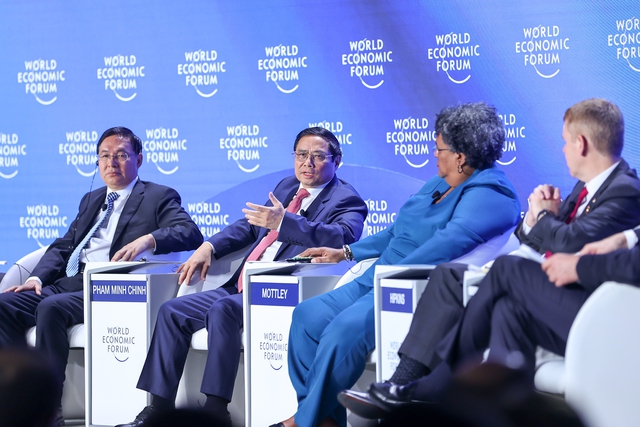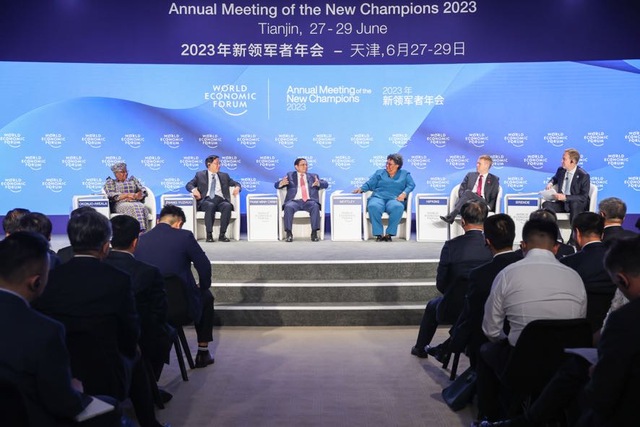Vietnam ready to create optimal conditions for int’l businesses: PM
Vietnam is committed to focusing on three strategic breakthroughs: the development of infrastructure, the improvement of institutions, and the enhancement of human resources.
While continuing to improve the investment environment for entrepreneurs, Vietnam remains committed to providing optimal conditions for international and domestic businesses.
| Prime Minister Pham Minh Chinh during the session. Photos: Nhat Bac |
Prime Minister Pham Minh Chinh underscored this view today [June 27] at the World Economic Forum (WEF)'s 14th Annual Meeting of the New Champion in Tianjin, China, entitled "Braving the Headwinds: Rewiring Growth Amid Fragility."
He called on countries and international organizations, including the WEF and its members, to continue cooperating and supporting Vietnam in various fields such as technology, finance, human resources training, and management expertise. "This support would enable Vietnam to continue pursuing its socioeconomic development objectives."
During the conference, the Prime Minister shared Vietnam's experiences and lessons in fighting the pandemic, facilitating recovery, and promoting economic growth.
He reiterated Vietnam's commitment to three strategic breakthroughs: infrastructure development, institutional improvement, and human resource enhancement.
In particular, Vietnam will pursue a holistic approach that prioritizes equity, progress, social security, and environmental protection rather than pursuing growth at the expense of these factors.
The Prime Minister highlighted six major "headwinds" impeding global economic growth, including a global economic slowdown; rising inflation; difficulties faced by people in their daily lives; the lingering effects of the Covid-19 pandemic; geostrategic competition and protectionism leading to fragmentation; conflicts threatening global food and energy security (including the situation in Ukraine); the limited capacity of developing countries to cope with external shocks; and the increasing complexity and unpredictability of climate change, natural disasters and epidemics.
| Overview of the session. |
WEF Executive Chairman Borge Brende recognized Vietnam as one of the fastest-growing economies in the region. He highlighted the dynamic development of ASEAN and its potential to contribute significantly to regional and global economic growth.
In his opening remarks, Chinese Premier Li Qiang reaffirmed his commitment to promoting high-quality, stable and sustainable development of the Chinese economy in the long term. He pledged to expand the market, strengthen cooperation, and create opportunities for global economic recovery and investment.
He also underlined the need for collective action to address global challenges such as public health governance, climate change, rising debt, and slow growth.
The WEF Tianjin Conference, the WEF's second largest flagship event after the Annual Meeting in Davos, was attended by over 1,400 delegates, including Prime Ministers/Ministers from 21 countries and leaders of 850 global companies, agencies, and organizations. Vietnam was among the five countries invited at the Prime Ministerial level, along with China, New Zealand, Mongolia, and Barbados.
During the discussion session, government leaders, international organizations, and business representatives from around the world assessed the global economic situation and proposed solutions to capitalize on opportunities and stimulate growth effectively. Speakers emphasized the importance of strengthening linkages, avoiding fragmentation and protectionism, and adopting a global perspective. They also called on countries to mobilize diverse sources of capital for green development and climate action.
In addressing the "headwinds," Prime Minister Chinh presented a comprehensive approach and outlined six key orientations that require a global perspective and the engagement of all individuals, as these issues affect people worldwide. First, Chinh emphasized the need to strengthen international solidarity and promote multilateralism by putting people at the center, considering them both the goal and the engine of development. Second, the approach should focus on revitalizing production and business, creating jobs, promoting trade and investment, and facilitating capital flows, markets and products. International organizations, major countries and international financial institutions should adopt policies that unlock resources and activate new growth drivers, including digital transformation, green growth, circular economy principles, market diversification, and combating protectionism. Special attention should be given to prioritizing support for poor and developing countries. Third, it should include implementing appropriate measures to stimulate aggregate supply and demand through monetary and fiscal policies, promoting trade and investment liberalization, and addressing energy and food price issues. Fourth, Chinh emphasized the importance of avoiding politicizing economic relations and minimizing factors hindering global development. Fifth, he stresses the importance of seeking early solutions to conflicts. Sixth, the Prime Minister calls for strengthening public-private cooperation and creating favorable conditions for businesses, especially small and medium-sized enterprises. |













